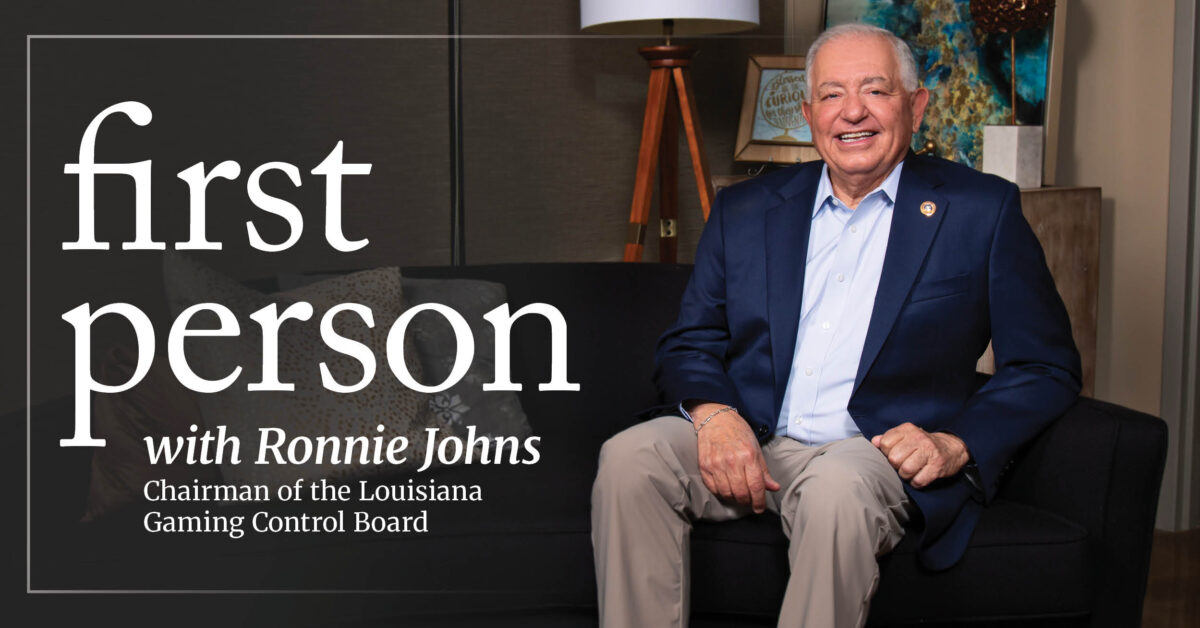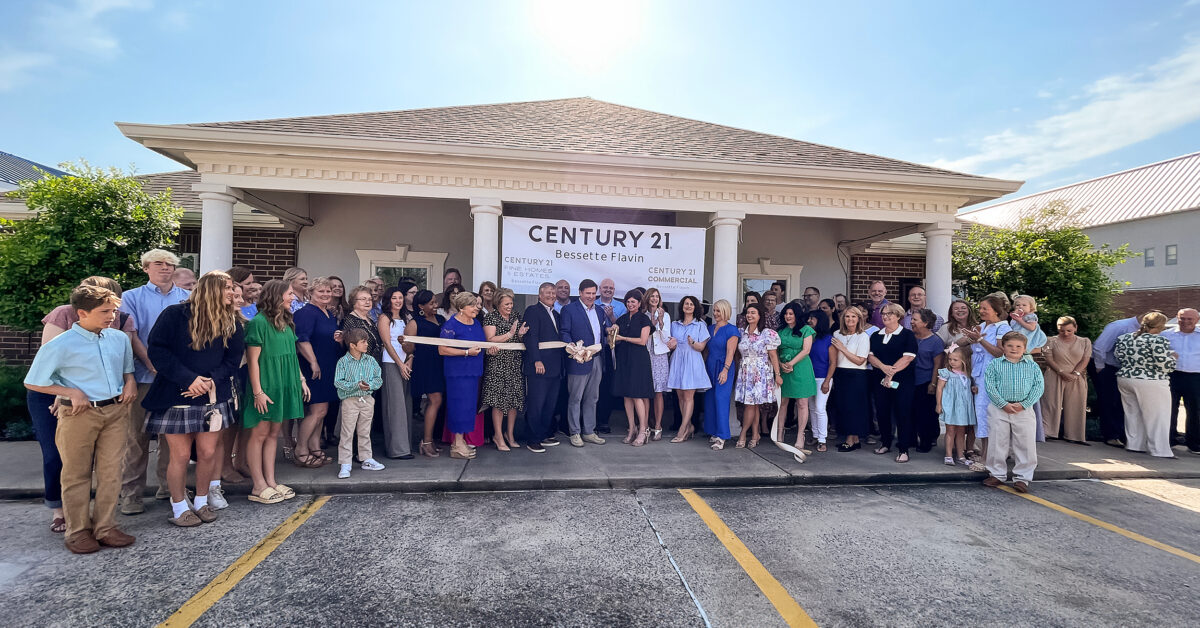
Gaming in SWLA
September 2023
National Better Breakfast Month
September 2023by Kristy Como Armand
Only one person, Ronnie Johns, in the state’s history has chaired both the state’s Lottery Corporation Board and the Gaming Control Board. A well-respected state legislator from Southwest Louisiana, Johns served 12 years as a Representative, and nine years as a Senator before accepting the appointment in 2021 from Governor John Bel Edwards to become Chairman of the Louisiana Gaming Control Board. The State Gaming Control Board serves as the regulatory body for the state’s riverboat licenses, racetracks, video poker the land-based casino in New Orleans, and now, sports betting.
Johns called SWLA home for nearly 40 years before he and his wife Michelle recently moved to Lafayette. He took the helm of the Control Board just after sports betting was approved by voters in 55 of the state’s 64 parishes. Now two years into his new leadership role, Johns talked with Thrive about the gaming industry in Louisiana.
What factors influenced your decision to accept the appointment as the Chairman of the Louisiana State Gaming Control Board?
There were a number of factors that helped me make such a hard decision. I was particularly close to former Chairman Ronnie Jones and he encouraged me to pursue the job as he and I had worked on a number of pieces of legislation that completely modernized the gaming industry. I had passed legislation in 2018 that allowed the old legacy riverboats to become land-based operations, and I really wanted to be a part of the transition process. Additionally, I recognized that this position absolutely requires the highest level of integrity and I honestly felt I could bring that to the table, while continuing to serve the state in a meaningful way.
How did your time in the state legislature prepare you for the chairman position?
The 22 years I spent in the legislature has proven to be invaluable to me and the regulatory process. I fully understood going in what it meant to not only regulate the gaming industry, but to also be able to sit down and listen to their legitimate business concerns and work with them in a fair, but consistent manner. Also, as the first ever former legislator to chair this board, I had a complete understanding of the legislative process and how to work with legislators to draft good and meaningful legislation. We have not always agreed on everything, but they know my door is open to them and they will get a fair answer.
How challenging was the process of developing Sports Betting regulations before it could begin?
In 2020, we passed legislation calling for a statewide referendum on Sports Betting. In the 2021 session, which ended in June of that year, we passed the final version of how it would work. A month later, I resigned from the Senate and accepted the job as regulator over all aspects of gaming. My first and most important order of business was to implement a Sports Betting format for our state. Let me say, it was not easy. So many people thought we’d just turn on a switch and sports betting would commence. It was complicated going through all of the legal aspects and what could be done and what could not be done. We had to figure out a way to prevent those living in the nine “no” parishes from betting on their mobile devices while in the confines of those parishes. Incredible technology makes this possible. We had to work with betting platforms to ensure no one under 21 could get into the system, as well as recognizing problem gambling. A lot of people put in long hours over a stretch of mere months to get this done, and while some people were pushing us to roll it out, we were patient and did it the right way. I’m very proud of how we did it and to see very few issues with the finished product.
What has been most challenging about this position?
Learning that gaming law is completely different from civil or criminal law. That’s why one of the first things I did was hire an outstanding in-house attorney who works directly with me. The Attorney General’s office also has a Gaming Division with approximately 20 attorneys who do nothing but gaming work. They have all taught me a lot. Another challenge was stepping back completely from all political activity. I am prohibited by law from this. I cannot publicly support any candidate, contribute to campaigns, or even attend any kind of political function. After giving a total of over 30 years to public service, this has been a big change, but is absolutely necessary to protect the regulatory process.
Did anything surprise you about the position?
Yes, the amount of people it takes to regulate the gaming industry. There are 16 casinos, four racetrack casinos, over 200 video poker truck stops, and sports betting in our state. In addition to the team at the Attorney General’s office, I have a staff of five and the State Police Gaming Division has over 200 troopers and a staff of civilians who do nothing but gaming-related work. It takes a lot of people and effort on a daily basis to keep the industry compliant and running the way it should.
What is a typical work week like for you?
This is a full-time position and my office is in Baton Rouge in the State Police compound. Every employee of every gaming entity in the state has to hold a gaming license, and we have to sign off on every application approved by the State Police. The vendors who do work or supply the gaming entities have to hold a license – about 30,000 to 35,000 licenses that are valid at any one time. We also have to approve administrative actions against those license holders who violate our laws or rules. It’s our responsibility to approve the licensing of all of the casinos and video poker truck stops, as well as the bars and restaurants who have the machines. There are over 12,000 video poker machines in operation on any given day. Every day I am working with all of the support staff who make this huge industry work. The gaming Industry is the most regulated industry in our state, and it is my job to see that is done fairly and efficiently.
What insight regarding the gaming industry’s role in the state’s economy can you give us, specifically the Southwest Louisiana gaming market?
The gaming industry statewide is now the leading source of private industry revenue for the state budget. It brings in over $1 billion a year in state revenue. That includes the Lottery, which I don’t regulate. For comparison, oil and gas was the top source of private industry revenue for many years Today it brings in less than $600 million a year. The revenue for gaming does not include local gaming taxes that the casinos pay, which is in the multiple of millions; nor does it include the sales taxes it generates, huge property taxes, and the over 30 thousand jobs it creates. So, the impact to our state is huge. The SWLA market absolutely dominates the industry in our state. The three casinos and one racetrack here do far more than any other market in the state. The SWLA market far outpaces the New Orleans, Baton Rouge and Shreveport/Bossier market and the reason is simple: Texas customers coming into the destination properties that have been built. The investment in SWLA is in the billions, and it’s not just the gaming aspect that drives this. It’s the amenities such as restaurants, pools areas, spas, golf courses, and more that draw people in. That is one reason why our Board will not allow a casino to operate without some degree of amenities to add to the draw of customers.
Is there anything you wish people would understand about the gaming industry in our state that you feel they don’t?
This is an interesting question because since I became Chairman, I have tried to drive this point home about the gaming industry. We tax the gaming industry more than most states do. They pay 21.5% of state tax plus an average of an additional 6% local gaming taxes. As I said earlier, this is on top of the property and sales taxes they pay, as well as the sales taxes their vendors pay. They also pay taxes on any promotional dollars they may offer to get a customer to come to their property – basically paying taxes on their own money. Very few states tax this, but Louisiana does. These businesses get absolutely none of the tax incentives most other businesses enjoy, such as industrial tax exemptions on their property, Quality Jobs tax credits, or Enterprise Zone tax breaks. If our state wants to entice a private business to come to Louisiana, they typically offer a multitude of tax breaks and incentives, yet the gaming industry is prohibited from participating in those incentives. I’m not saying this is right or wrong, but it is a reality most people are unaware of. Also, I remind people constantly that every form of gaming we have in our state was voted on by the people where it’s located. The legislature has never enacted a form of gaming not voted on by the people. This is why you see such a difference in every parish of this state of what gaming is allowed and what is not allowed.
Any immediate concerns about the industry and its future?
We are always concerned about what Texas is going to do in the future with gaming. The Texas legislature has always taken an opposing view to gaming, but the demand from its constituents is likely going change that. I predict Texas will some day have various forms of legalized gaming. It may not be in the immediate future, but it eventually will happen, and when it does, it will have a huge impact on Louisiana revenue, especially in the SWLA and Shreveport/Bossier markets. The industry here is aware of this and keeping a close eye on what may happen.
My second concern is problem and compulsive gambling. It’s been refreshing to see the proactive approach the industry is taking to be responsible with their customer base. The industry realizes they have an obligation to address this directly. I’m proud that in Louisiana we have a very active and first-class compulsive gambling program for those who need it. There are both inpatient and outpatient programs available at no cost to the public. This past legislative session, I advocated for, and was successful in getting, more of the sports betting revenue dedicated to compulsive gambling. We have a moral obligation to do that.
The third issue facing the industry is the proliferation of offshore illegal gambling. These are unregulated, online gambling sites that do not restrict underage participants and pay no tax revenue. We estimate it to be a $14 billion a year problem. Only Congress can get a handle on this and Louisiana is leading the way in advocating for control of this very serious problem.






